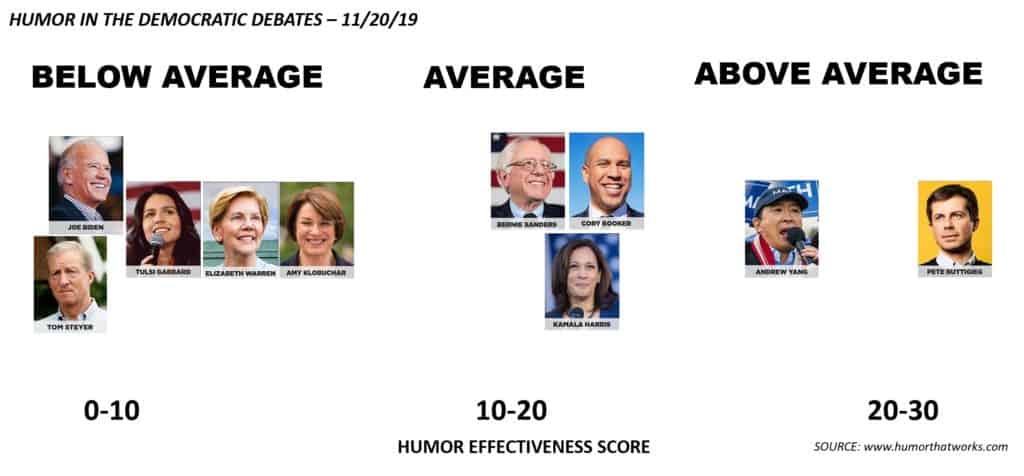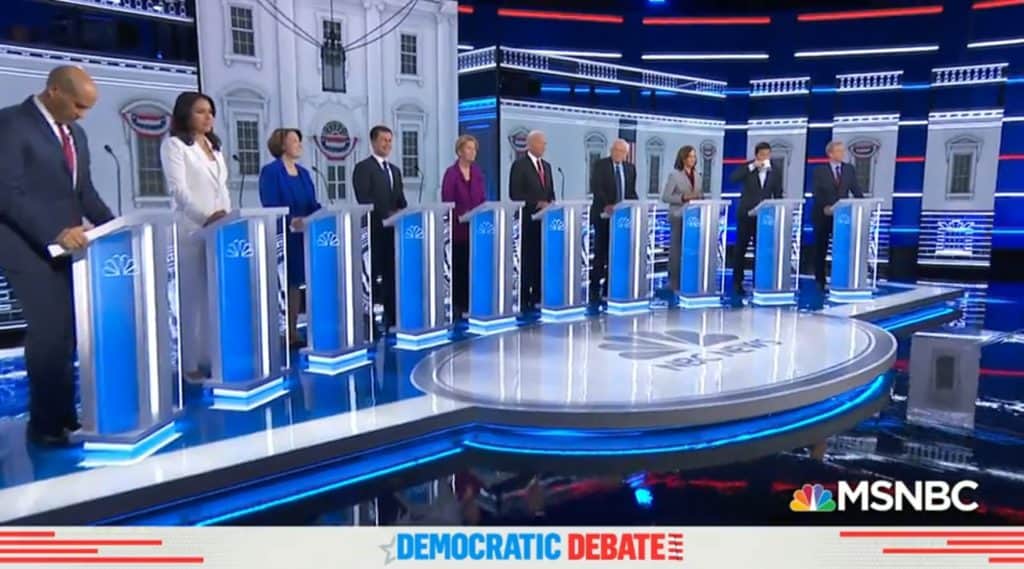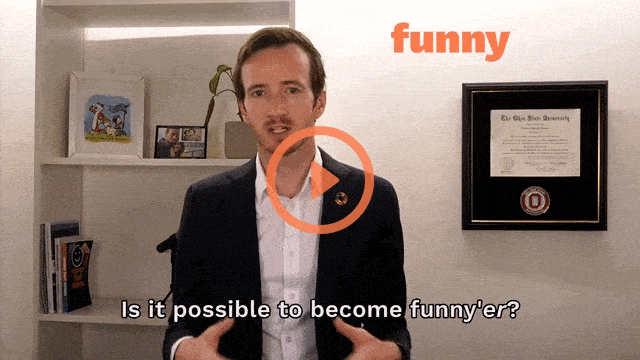Yesterday’s November Democratic Debate of 2019 was another opportunity for the Democratic candidates to make a mark leading into the final debates of 2019 in December. Like all forms of communication, humor played a valuable role in either helping or hurting their cause.
As we did for the for the last two debates, we decided to take a look at how humor was (and wasn’t) used by each of the candidates. The goal was not in analyzing the content of what was said, but rather the manner in which humor was used.
Joining me once again was Dave Tarvin, PhD, a Texas A&M lecturer in subjects including the Rhetoric of Humor, Intercultural Communication, and Leadership & Conflict Resolution. And yes, still my brother.
To review the humor in the debate, we calculated a “Humor Effectiveness Score” for each candidate.
For every humor attempt in the debate, and in some cases, the missed opportunities, we rated the effectiveness on a scale of -5 to 5. The HES is the sum of that score by candidate, and effectiveness was a subjective measure that included audience reaction, humor delivery, and humor purpose.
Here’s how the candidates did using humor:

30 – Pete Buttigieg
DAVE: Buttigieg’s self-defeating humor with regards to his golf game and wealth (compared to the other candidates on stage) was lighthearted and fun. He got more laughs, however, when he went more aggressive towards President Trump with regards to developing artificial intelligence resources. Buttigieg said, “After all, he’s relying on 17th-century security technologies like a moat full of alligators or a big wall.” When Gabbard attacked Buttigieg’s experience, Buttigieg came back swinging hard. “Par for the course in Washington to take remarks out of context, but that is outlandish even by the standards of today’s politics.” He was referring to Gabbard’s mischaracterization of his words. Gabbard demanded the fact-checkers at home to find the truth. Well, @LatinoRebels tweeted the exchange from ABC7 between Buttigieg and Adrienne Alpert, which Gabbard referenced. In the interview, Buttigieg says “If it is in the context of a security partnership, then I would welcome ways to make sure that America is doing what we can do ensure our neighbor to the South is secure.” With the ‘facts checked’ as Gabbard demanded, Buttigieg’s aggression towards her is warranted.
DREW: Buttigieg followed up a solid performance in October with the strongest humor performance of the night. He had a few strong associations that helped make his points, a few jokes directed at Trump, and a couple of heartfelt moments, including a great setup line, “Before I share what’s in my plans, let me share what’s in my heart.” In his back-and-forth with Gabbard, he delivered a strong punchline, “Do you think anyone on this stage is talking about invading Mexico?” His only real stumbling block was that he didn’t stop there, making one more comment about Gabbard’s previous meetings with dictators, which made him come across as more aggressive than he needed to be.
23 – Andrew Yang
DAVE: Yang was not given the speaking time the other candidates had, and his serious demeanor and expressionless face made him seem intelligent, but distant. His use of humor really helped make him relatable and I understand why he is polling well with the 18-29 demographic. My favorite moment that displayed Yang’s wit was his jab at Trump when asked what he would say to Putin in the first call as President. “First, I’d say I’m sorry I beat your guy.” This jab seems soft with the apology, but with a sting at the connection between Putin and Trump.
DREW: Yang had a great showing tonight despite his limited talk time (the least of all the candidates). In those ~7 minutes of airtime, he managed the best line of the night (the Putin line Dave mentioned), along with a couple of relevant stories, some positive observations, and a strong closing call-to-action. He painted a picture of being compelled to run for wanting to make a change, something many people can relate to.
18 – Cory Booker
DAVE: I had high hopes for Booker as the winner of the last debate in terms of humor. I was disappointed that his humor served best as witty comments that seemed un-rehearsed and natural, but not strategic. While his humor was not up to par with previous performances, Booker’s rhetorical prowess was on full display in his conclusion. He stated, “I had a closing statement prepared, but I saw in the audience during the break a man named John Lewis. And perhaps it’s interesting and important for me to mention why I’m so grateful to him.” Booker then juxtaposed his history with the future of the United States. Pulling from Dr. King’s famous last speech, Booker claimed, “We need to go to the mountaintop.” He continued, “We all drink deeply from the wells of freedom and liberty that we did not dig.” Booker’s cultural reference and historical connections seem appropriate and fitting to his ethos as a candidate. Gabbard tried a similar tactic in her conclusion, but failed.
DREW: Booker has had strong humor performances the last two debates, though it felt a bit lacking here. This is perhaps unfair given that he still used it the third most effectively of the ten candidates, but expectations do play a role in the way humor is perceived. Still, Booker did have some of the best lines of night, including a strong sequence where he made a joke about understanding the black voter (considering “he’s been one since he turned 18”), pivoted to wondering if Joe Biden was high when he said we shouldn’t legalize marijuana, before tying his examples into a call to change discriminatory practices around marijuana.
17 – Kamala Harris
DAVE: Harris’ background as a prosecutor was demonstrated on the stage. After Gabbard defended her attack of Hillary Clinton as the ‘personification of the rot that has sickened the Democratic Party,” Moderator and Washington Post White House reporter, Ashley Parker, asked Harris if she had a response. Harris replied, “Oh, sure,” which received quite a bit of laughter, before sharing why she thought it unfortunate that Gabbard was participating in the debates as she has been “full time criticizing people on this stage as affiliated with the Democratic Party.” Her aggressive attack of Gabbard was applauded by the audience. To me, the humorous element of Harris’ performance was her continued push (three separate times) for an Obama coalition, which she never defined. When Biden suggested he was part of the coalition because the ‘only African-American woman elected to the US Senate’ was supporting him, Booker and Harris jumped in to prove that’s not true. “The other [Black woman Senator] is here,” she said referring to herself. Biden’s gaffe and Harris’ response received great laughter from the audience.
DREW: Harris had another solid debate night, and though she didn’t use a tremendous amount of humor, she did do it well. Perhaps her strongest moments were off-the-cuff, such as when she was asked to respond to Gabbard’s comments, (“oh sure!”), and when Biden made a gaffe saying “the only black woman senator” instead of “first black woman senator.” She has an opportunity to continue clarifying her message using association, but her line about having only one client since she got into politics (“the American people”) is a great start.
16 – Bernie Sanders
DAVE: In my opinion, Sanders won the night with regards to humor. His humor was appropriate to his ethos as established in previous performances. Unlike Booker, Sanders delivered what I had come to expect from his humor strategies. His humor is more witty than rehearsed, so each humorous moment is both a surprise and expected. When discussing Obamacare, the moderators asked other candidates their thoughts on changing it before turning to Sanders. “Thank you,” he said exasperated, “I wrote the damn bill.” His off-the-cuff remark to Biden that he likes Putin (based on the framing of the question by the moderators) was my favorite moment. Biden played along with the joke and the audience seemed to enjoy it.
DREW: Sanders continues to get great leverage by his persona on stage, even making the clear joke about Biden and Putin, and in setting up his final answer, “Let me say a word about myself.” He still has opportunity to use humor more, but for his style it may not be necessary.
9 – Amy Klobuchar
DAVE: Klobuchar did so well in previous debates with regards to humor, that I may have expected too much from her this time. Her best line was in reference to gender equality in politics, when she stated, “And if you think a woman can’t beat Donald Trump, Nancy Pelosi does it every single day.” Aside from that, she seemed to stay away from the strategies she used in previous debates.
DREW: Klobuchar did okay after what seemed to be a very nervous first half of the debate. Nerves can be a very real thing and she may have done herself a favor if she had made a self-deprecating joke about her own as a way to call the moment and get a laugh from the audience. Once she hit a couple of decent lines, including “Name your favorite female president,” she settled in a bit more, but still was lacking, particularly compared to her previous performances.
7 – Elizabeth Warren
DAVE: Warren came across as robotic to me. Her talking points seemed to be too formulaic. While story-telling is great, she has employed this strategy too many times. Every “I remember what it was like when I…” becomes tiresome. I think punching up her humor would serve her well to connect with the 18-29 demographic.
DREW: Warren’s go-to humor strategy tends to be positive stories related to her upbringing, which she used well in her closing answer. However, as Dave mentioned, she made need to vary her approach. Her story about why more people should serve, and the worry that comes with waiting for a letter from a loved one in service, didn’t really support the point she was trying to make.
5 – Tulsi Gabbard
DAVE: Gabbard didn’t seem to do much to support her case. She culturally appropriated her conclusion to draw upon references to Dr. King. It seemed unwarranted and inappropriate, especially since her statements about King’s visit to Hawaii did not match the platform she presented throughout the debate. She appropriated King’s image to connect her with “racial harmony” and defeat the “divisiveness of Donald Trump.” And yet, she was extremely divisive towards Harris and Buttigieg. It came off as disingenuous.
DREW: Gabbard had an aggressive night all around, getting into it with both Harris and Buttigieg, but didn’t use other humor to soften her stance. She had a couple of burns that landed well, but she also came across as an upset outsider.
3 – Joe Biden
DAVE: The potential was great, the kairos perfect, but the delivery failed. Biden stumbled and messed up several times, making his joke that Trump and Putin do not want him to be President more awkward than funny. Although he messed the lines up, he got the correct wording for soundbites, which make the line seem punchier than it was. Biden’s best moment was a backhanded comment with Bernie Sanders over liking Putin. Biden’s angry chant at the end, “Get up and take it back!” may be warranted, but seemed a bit off and over the top.
DREW: Biden had some decent moments on paper, but it’s his gaffes that continue to bring down his effectiveness. What was even more telling this time was that his body language seemed to suggest that even he knew he was messing some lines up and yet he still didn’t use any humor to help us move on from the mistake. For the second debate in a row, he remained relatively calm throughout the debate, then seemingly out of nowhere gets angry, telling people to “get up” as part of his closing statement.
2 – Tom Steyer
DAVE: Steyer’s presentation style is more stoic than humorous. He didn’t move much and looked directly into the camera. His presentation was less conversational than his counterparts. I didn’t see him utilize humor purposefully or unintentionally. He was dry. His comments about his commitment to climate change were his best moments.
DREW: Steyer didn’t attempt much humor the entire debate, getting only light laughter for referring to Trump as the criminal in the White House. Even more surprising was that he kept referring to “whoever wins,” almost implying that he already knows that it’s not going to be him.
SUMMARY
DAVE: The moderators did an excellent job of cutting off candidates for speaking too long, but I worry their punctuality hurt humor potential. This debate seemed less humourous overall than previous debates, and I think it was due to the nature of the format. The moderators cut off candidates and ended discussions by asking a different moderator to pose a different question. By ending the heated discussions that could provide some flames for humorous, unplanned moments, the moderators stopped humor from happening in some cases. For instance, the exchange between Biden and Sanders over liking Putin was unplanned and hilarious, but rarely happened due to the nature of moderation. Sanders’ unintentional humor is my favorite and I wish there would have been more of it. With regards to humor as strategy, however, the winner would be Buttigieg as his humor was planned and landed well.
DREW: There continues to be key moments in the debates where humor could really help a candidate out but seems to go missing. Buttigieg had a strong night, Yang showed great improvement from the previous outings, and Harris had a few strong lines. It was nice to see the moderators have a bit of a sense of humor as well, particularly in keeping people on-task to the questions asked. I agree with Dave that the style may have cut short some spontaneous humor, which means intentional humor by the candidates could have helped them stand out even more.
…
For more, check out our series on Humor in Unexpected Places. For media inquiries, contact [email protected] or call 646-543-7398.



